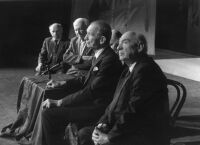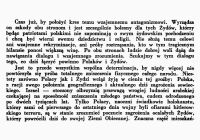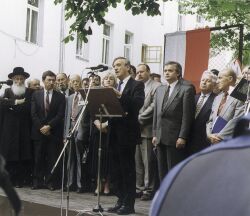





Jan Karski - emissary of the Polish Underground State, proponent of the Polish-Jewish rapprochement at the meeting with the Warsaw's Jewish community, 2nd February 1997, State Jewish Theatre in Warsaw.
Twenty "Righteous Among the Nations" during the ceremony of presenting the medals, Jewish Theatre in Warsaw, 23th October 1996. By the January 2006 with this title there have been honoured over 21thousand people, including 5941 Poles.
Frame from the Claude Lanzman's film, "Shoah" (1985 r.). Polish boys living in the vicinity of Treblinka talking about the Jews. This film, showing the primitive Polish antisemitism in definitely biased way, encountered much criticism from the Poles, both in Poland and abroad.
Jan Błoński's essay "Biedni Polacy patrzą na getto"[The poor Poles look at the ghetto], Tygodnik Powszechny 1987, that initiated debate on the obligations of the Poles towards the Jews during the II World War.
Pope John Paul II shakes hands with doc. dr Szymon Datner during the audience in Warsaw , 14th June 1987. Pope met with the representatives of the Jewish community during each of his visits in Poland.
Modlitwa biskupów polskich za pomordowanych w 1941 r. Żydów w Jedwabnem, Warszawa 27 maja 2001. Ujawnienie przez Jana Tomasza Grosa okolicznoci tej zbrodni, w której aktywny udział wzięli także Polacy, było szokiem dla większoci społeczeństwa polskiego. Wywołało burzliwš dyskusję na temat stosunków polsko-żydowskich w czasie wojny.
|

Fragment of the emigration activist's (Michał Borwicz, Józef Lichten, Simon Wiesenthal and Jan Karski, Jerzy Lerski and Jan Nowak) appeal initiating the Polish-Jewish dialogue, published in monthly magazine "Kultura" (Paris) in 1983.
Israeli ambassador in Poland, Gershon Zohar, presents the medal "Righteous Among the Nations" on behalf of the government of Israel, Jewish Theatre in Warsaw, 23th October 1996 r.
Lech Wałęsa speaking in the Israeli parliament - Knesset, May 1991. His visit to Israel was a turning point in Polish-Jewish relations. The then President of the Republic of Poland on behalf of the whole Polish nation asked pardon for the wrongs the Jews experienced in Poland. On the 11th June 1995 prelate Henryk Jankowski, parson of the St. Birgitta's parish, during his sermon in presence of the President of Poland said, that "symbol of Star of David is inscribed into symbols of swastika and sickle and hammer". Those words shocked the whole world. After a while they acquainted equally strong criticism from the Polish authorities - secular and church.
Israeli youth during history lesson at the Jewish cemetery in Warsaw. The Polish-Jewish dialogue will not be possible if the youth will not engage in it; that is why one should think over the issue of common educational programme for Polish and Jewish schoolchildren.
|

Elie Wiesel speaking during the ceremony of the 50th anniversary of the pogrom in Kielce. Unfortunately the solemn character of the ceremony was disturbed by the "trifling", however for the Poles very touchy incident. Elie Wiesel, Nobel Peace Prize winner, in the presence of the state and church dignitaries, appealed for removal of all the religious symbols, including crosses, from the camp site.
"Solidarity" broke down the walls of silence surrounding the Polish-Jewish relations. In 1983 the prominent personages of Polish origin living in the West (i.a. Simon Wiesenthal and Jan Karski) appealed for putting an end to this antagonism and focusing on the issues that unite the Poles and the Jews. The following year there was organized Polish-Jewish meeting in Oxford and another in Jerusalem. Later on there took place numerous panels and seminars. In 1986 there was established the Episcopate's Commission for Dialogue with Judaism. Four years later Poland and Israel reestablished their diplomatic relations broken off in 1967. The visit of the Pope John Paul II at the Auschwitz death camp and Lech Wałęsa's speech at the Israeli parliament - Knesset became landmarks on the route to the Polish-Jewish reconcillation.
The Pope John Paul II visiting Auschwitz-Birkenau, 7th June 1979. The declaration of the Second Vatican Council "Nostra aetate"(1965) and the election of Pope John Paul II, who regarded fulfilling of the Council's decisions as one of the main aims of his pontificate, were significant events leading to reconcilliation of Christianity and Judaism.
|

